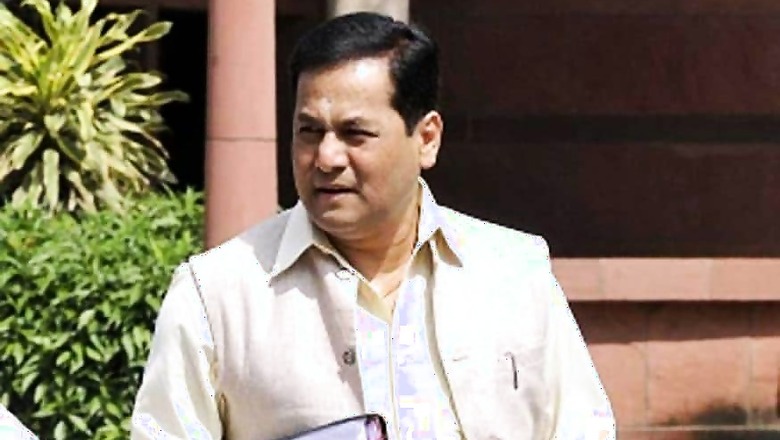
views
New Delhi/Guwahati: With the Supreme Court ordering a draft to be prepared of the National Register of Citizenship (NRC) to curb ‘illegal immigration’, minorities in Assam are wary of losing their citizenship if their gram panchayat certificates are considered invalid.
As the December 31 deadline for the NRC draft approaches, the All Assam Minorities Students Association (AAMSU) has claimed that a fear has gripped the “genuine Indian citizens”.
The union says it is doubtful if the gram panchayat certificates, submitted by many, would be considered valid for the exercise.
The latest NRC comes after the Supreme Court linked illegal immigration to "external aggression" in Assam and ordered a draft to be prepared by January this year, which was later extended to December 31. The last NRC in Assam was processed in 1951.
Talking to News18, Azizur Rehman, president of AAMSU blamed the government for not taking steps to overcome this fear among minorities.
He said, “There is a fear within the minorities. The government, as an authority, should work to organise public awareness meetings in order to allay such fears. Yet, it is silent. It has instead stationed paramilitary forces in the minority-dominated areas.”
In February this year, the Gauhati High Court ruled that the panchayat certificates had no legal validity.
Even though a panchayat certificate is among the 11 documents approved by a sub-committee of the state cabinet in 2010 to prove citizenship, in itself, the HC stated that it cannot be treated as a link document by an applicant to prove citizenship. It can only be a supporting document.
However, organisations like AAMSU have appealed to the Supreme Court against the HC verdict. Deciding on a bunch of petitions in August, a two-judge SC bench ordered the NRC coordinator in Assam, Prateek Hajela, to file a report within six weeks on how many of the 48 lakh applicants, who had submitted only a panchayat certificate, were “original inhabitants” of the state. The next date of hearing is November 15.
The AAMSU president also said that reports of minority groups bringing in crores of people in Guwahati for November 27, is "false propaganda".
"There is no such congregation on the cards. There will be peaceful rallies from villages. These people have only two demands. First, those who entered Assam post-1971 should be deported and second, in the name of D-Voter and foreigners, random harassment that is being carried out on genuine Indian citizens should stop,” said Rehman.
However, state NRC coordinator, Prateek Hajela is of the view that raking up the matter would be improper as it is sub judice.
“The matter is sub judice as the Gauhati HC has already said that gram panchayat certificate will, at best, act as a private document and therefore it cannot be used for NRC. Now, there is an appeal in form of a Special Leave Petition (SLP) at the Supreme Court and the next hearing is on November 15. I have informed the SC that around 47 lakh such certificates have been submitted," said Hajela.
Hajela also said that the happenings at the foreigner tribunals were beyond the scope of NRC to intervene, as the tribunals are an appellate authority.
"Doubtful voters or D-voters have been found to be unsure of their citizenship rights. That's how the cases have been referred to foreign tribunals. Now, the SC has ruled that D-voters will have to wait for the orders from the foreign tribunals. This is an appellate authority above the NRC and hence if a matter is pending before the tribunal, we cannot get into it,” said the state NRC Coordinator.
All Assam Students Union's head, Lurin Jyoti Gogoi too reiterated that the Panchayat certificates were only supporting documents.
"How can these certificates be proof of citizenship? These are just supporting documents. This is false propaganda to gain sympathy for crores of illegal immigrants. This draft NRC would drop at least 50 lakh people from the citizenship list," said Gogoi.
On the other hand, human rights lawyer Aman Wadud who Pro Bono has fought cases for the minorities, said, “My main concern is the probable distinction between an original inhabitant (OI) and a non-original inhabitant
“Initially, the OI was given to tea garden workers and others like them, who didn't have documents. It was given with the agreement of the local NRC authority. If officials thought beyond doubt that the person was from Assam, they were given the OI status. Now, except for Muslims and Bengali Hindus, almost everyone is an OI," said the lawyer.
Wadud feels that this distinction might make its way into the draft NRC, thereby rendering scores of people stateless.
"There are many places where Muslims still are not original inhabitants, despite some of them being able to trace their parentage to over 100 years here. There is a bias that can been seen. This problem may creep into the draft NRC as well. After it is published, there may be a classification between OI and non-OI," said Wadud.
However, the state NRC Coordinator allayed such fears and said that "no such distinction will be made".
"We are making no distinction between the original inhabitants and non-original inhabitants. The draft will include all Citizens of India irrespective of what the mechanism is, by which their citizenship was determined. Someone must be in the 1951 list and some in the voters list. We are considering all of these," said Hajela who is also judging the veracity of the documents by asking the issuing authority to check the authenticity.
With the NRC is now racing towards its December 31 deadline to determine how many of Assam’s 34 million people are Indians, Wadud, who has travelled extensively in Assam for these cases, thinks that it's the minorities who have all their in place documents as compared to the others.
"This was a blessing in disguise as immediately after partition, Muslims were a harassed lot, so they have preserved all the documents. These documents are more precious to them than their lives. It’s the basis of their existence," said Wadud.
Hajela told News18 that the main task before them was to check the consistency of the claims being made.
"We are also looking into the consistency of the claims being made by people to establish a family tree. In Assam, it is citizenship by descent unlike the rest of India and hence, we are checking the links to their ancestors," said Hajela.
But Wadud still feels that if the Citizenship Bill sees the light of the day, which proposes to give citizenship to all persecuted minorities from neighbouring nations that categorically exclude Muslims, it will be a sail through for the original inhabitants or OIs.
"The government is even deliberating a Bill to grant citizenship to Bengali Hindus who came here till 2014. Now, Bengali Hindus will also be OIs even if they entered Assam one or two years ago. So, this entire process is only about targeting Muslims. Till now around 1.5 crore people have been declared OI and all Muslims have been left out," said the human rights lawyer.

















Comments
0 comment